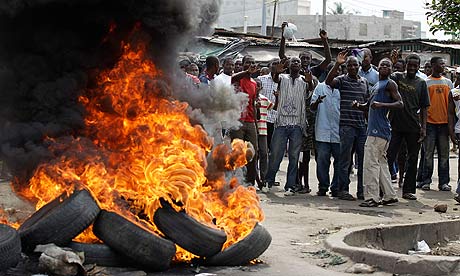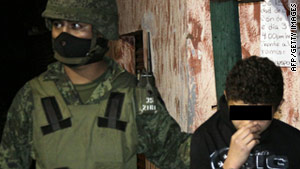Volume 5, Issue 18 – December 6, 2010
INTERNATIONAL CRIMINAL COURT
Central African Republic & Uganda
- VOA News: War Crimes Trial for Congo’s Former VP Opens at The Hague
- VOA News: Bemba Supporters Say War Crimes Trial is Political
- BBC News: Barack Obama’s Plan to Defeat Ugandan LRA rebels
- Radio Netherlands Worldwide: Bemba’s Soldiers Raped and Killed in the Central African Republic
Darfur, Sudan
- ICC: Pre-Trial Chamber I Requests the Cooperation of the Central African Republic to Execute the Warrants of Arrest of Omar Al Bashir
- Reuters: Sudan’s Bashir Absent From C. African Rep. Event
- ICC: The ICC Hearing on the Confirmation of Charges Against Abdallah Banda and Saleh Jerbo is Scheduled to be Held on 8 December, in the Absence of the Suspects
Democratic Republic of the Congo (ICC)
- LubangaTrial.org: Public Testimony Resumes with Prosecution Investigator
- LubangaTrial.org: Defense Examines Reliability of Intermediary 316
- LubangaTrial.org: Defense Concludes Examination of Investigator; Child Soldier Testifies
- LubangaTrial.org: Witness Testifies in Closed Session on ‘Climate of Fear’
Kenya
AFRICA
International Criminal Tribunal for Rwanda
- Hirondelle News Agency: Chamber Grants Amendments of Indictment for Rwandan Pastor
- Hirondelle News Agency: ICTR Asks Togo to Cooperate With Defence for Ngirabatware
- Hirondelle News Agency: Ex-MRND Leader’s Case Adjourned to January Next Year
- Hirondelle News Agency: Ngirabatware Says Allegations Against Him “False and Unthinkable”
- Hirondelle News Agency: Senegal Consents Hosting ICTR Convicts
- Hirondelle News Agency: Two ICTR Witnesses Ready to Testify Before French Judiciary
- Hirondelle News Agency: Prosecution Lists 50 Witnesses in Nizeyimana Trial
EUROPE
European Court of Human Rights
Court of Bosnia & Herzegovina, War Crimes Chamber
- Balkan Investigative Reporting Network: Neskovic and Ilic: Trial to Begin in December
- Balkan Investigative Reporting Network: Request for Extension of Custody of Miroslav Anic
- Balkan Investigative Reporting Network: Ivanovic: Hearing Postponed
- State Court of BiH: The Second Instance Verdict in the Case Against Miodrag Nikačević Dispatched
International Criminal Tribunal for the Former Yugoslavia
- Associated Press: UN Tribunal Holds Training Session for Serbia Legal Staff Handling War Crimes Cases
- Institute for War and Peace Reporting: Registry Challenges Seselj Judges
- Institute for War and Peace Reporting: Srebrenica Survivor Confronts Tolimir
- Institute for War and Peace Reporting: Witness Describes Serb Wartime Communications
Domestic Prosecutions In The Former Yugoslavia
- Bloomberg: Serbian Court Sentences Two for War Crimes During Bosnian War
- The Associated Press: Serbia to Retry Two Ex-Police for Slain Americans
- Reuters: Serbia asks US to Extradite Nazi Genocide Suspect
MIDDLE EAST AND ASIA
Extraordinary Chambers in the Courts of Cambodia
- Associated Press: Lawyers for Khmer Rouge Jailer Appeal Conviction
- The Phnom Penh Post: Court Confusion
- VOA Khmer: Challenges Await Newly Appointed Tribunal Prosecutor
Iraqi High Tribunal
- Associated Press: Iraq Court Gives Tariq Aziz New 10 Year Sentence
- Associated Press: Saddam Half Brothers Acquitted in Kurd Atrocities
Special Tribunal for Lebanon
NORTH AND SOUTH AMERICA
United States
- Reuters: Pakistani Sues U.S. over Drone Aircraft Strike
- Reuters: U.S. Soldier Pleads Guilty to Firing on Unarmed Afghans
TOPICS
Terrorism
- Agence France-Presse: Belgium Charges Nine over Terrorist Links
- Associated Press of Pakistan: Margalla Police Foil Terrorist Attempt
- Agence France-Presse: Pakistan Arrests Taliban over Karachi Attack Plots
- Agence France-Presse: Pakistanis, Nigerian Held in Spain over Terror Links
- Guardian Co Uk: Kenyan Activist to be Tried over Uganda Bombings
Piracy
- Al Arabiya: Germany’s First Pirate Trial in 400 Years Open
- Department of Justice Press Release: Five Somalis Convicted of Piracy Against USS Nicholas
Universal Jurisdiction
- El Universal: AI: “Venezuela is a Safe Haven for Foreigners Who are Responsible for Genocide”
- The Guardian: War Crimes Lawyers Seek Arrest of Sri Lankan President in Oxford
- British Embassy Washington: Foreign Secretary Comments on Universal Jurisdiction
- Reuters: UK Moves to Restrict Arrests for War Crimes
REPORTS
NGO Reports
- Human Rights Watch: Israel: Soldiers’ Punishment for Using Boy as ‘Human Shield’ Inadequate
- Human Rights Watch: ICC: Keep Pledges to Strengthen International Justice
UN Reports
- AFP: Top UN Official to Meet Myanmar’s Suu Kyi
- The Associated Press: UN Official: Bosnia War Rapes Must be Prosecuted
TRUTH AND RECONCILIATION
COMMISSIONS
General
- Solomon Islands
- Togo
- Canada
COMMENTARY AND PERSPECTIVES
- The Seattle Times: Watershed Moment for International Justice at The Hague
- Radio Netherlands Worldwide: Impunity Prevails in Afghanistan
WORTH READING
- Alexander Zahar: Civilizing Civil War: Writing Morality as Law at the ICTY
- Megan Fairlie: The United States and the International Criminal Court Post-Bush: A Beautiful Courtship but an Unlikely Marriage
—
War Crimes Prosecution Watch is a bi-weekly e-newsletter that compiles official documents and articles from major news sources detailing and analyzing salient issues pertaining to the investigation and prosecution of war crimes throughout the world. If you do not want to receive future issues of War Crimes Prosecution Watch, please email warcrimeswatch@pilpg.organd type “unsubscribe” in the subject line.



